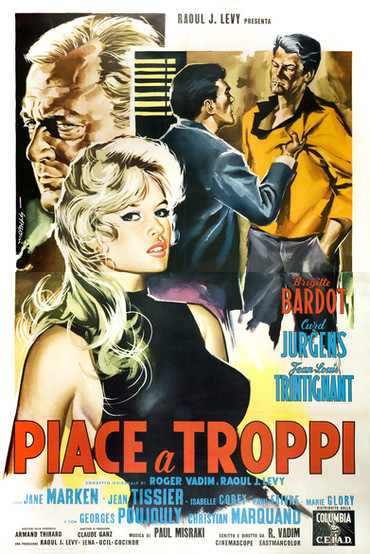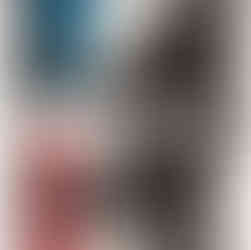Trintignant, Alpha to Omega...
- Ravi Swami
- Jun 20, 2022
- 5 min read
Updated: Jun 23, 2022
Film reviews on here have been less frequent lately but that doesn't mean I've stopped watching them, now that we are officially out of Covid lockdown - far from it. In fact I'm still exploring what's on offer on various streamers, now including YouTube, which seems to offering access to a number of more recent films.
Nothing I have watched so far has been unmemorable since they are for the most part critically acclaimed films with a "must see" rating, eg Bergman's "Smiles of a Summer Night", Kar Wai Wong's "Chungking Express", Juzo Itami's "Tampopo", Lionel Rogosin's "On The Bowery" and most recently Mario Monicelli's "La Ragazza Con La Pistola", thanks to notes I keep on films I have watched, and I may review them at some stage down the line.
S.S Rajmouli's ("Baahubali") insanely over the top "RRR" is the most recent film and addition (Netflix) and Dave King is on point with his review of the film at his film blog "OutOfDavesHead", so check it out. Rajamouli proves once again that he is the master of the cinematic equivalent of a "Juggernaut" and you can only submit to being crushed under the wheels by its' momentum :)
The recent news of the passing of Jean Louis Trintignant (at 91) and the fact that I had become more familiar with his work over lockdown beyond simply his name - a name that was frequently quoted in film review TV programmes long before I had the opportunity to watch any of the films he appeared in and led to me confusing him with other French actors - prompted me to check out a film from early in his career, Roger Vadim's "And God Created Woman" from 1956.
The film itself confounded any expectations based upon the film's posters which inevitably were designed to capitalise on the charms of Brigitte Bardot and helped to form my impression of the film as being slightly risqué.
There's no doubt that Vadim made full use of Bardot's dancer physicality and natural poise and her costume design leans heavily toward revealing more bare skin than was comfortable for the censors of the day and I did get the impression that certain scenes had suffered from the censors scissors as a result, not that they would be especially scandalous now.
Her role as "Juliette Hardy" in the film anticipates that of Bernadette Lafont 2 years later in Claude Chabrol's "Le Beau Serge" of an attractive young woman of loose morals living in a coastal French town, though unlike Lafont's role, there is no suggestion that she has been psychologically damaged by her interactions with men.
The film opens on Bardot's naked lower body stretched out on a roof as she sunbathes before we see her face and is followed by the arrival of a would-be suitor in the form of the worldly, wealthy and middle-aged property developer "Éric Carradine" (Curd/Kurt Jürgens) who makes a play for her affections by promising to gift her brand new car before she light-heartedly brushes him off.
Juliette's heart lies with the older brother of three who run a boatyard on the quay, "Antoine Tardeau" (Christian Marquand), but in reality he has no interest in her beyond her being a notch on his bedpost. When he returns to the town following an extended absence for business, Juliette tries to extract a confession from him in regard to his true feelings for her but when she overhears him boasting to his younger brother that he has the daughter of a wealthy client in his sights for marriage and views Juliette simply as a means to satisfy his sexual needs, she is thrown into confusion.
While the details of the film concern Carradine's bid for the brother's business in order to build a seafront hotel on the location, it's broader theme concerns the attraction to one woman by four generations of men and in how Juliette is depicted as being unable to make a decision about where her feelings lie, or in fact about anything, without the men in her life to tell her, when it could be seen that she is actually the one who is asserting her independence in making a choice - in that sense she could be seen to embody the trope of a sexually confident woman who is viewed as a threat to the stability of society, in much the same way as Lafont's psychologically damaged "Marie" in "Le Beau Serge".
The role of the sexually inexperienced middle brother "Michel" who is infatuated with Bardot's "Juliette" proved to be a career-defining role for Jean Louis Trintignant, although "And God Created Woman" was actually his third ever screen appearance, and it led to a significant body of work with the leading directors of the French New Wave and European cinema.
Trintignant's penultimate screen appearance was in Michael Haneke's 2012 film "Amour" (Eng: "Love"), by now obviously older, in an intimate and profoundly affecting ensemble piece with his co-stars Emanuelle Riva, playing his wife and Isabelle Huppert, as his daughter, respectively.
The film opens with a fire crew breaking into an empty Paris apartment where they discover doors have been taped shut and there is the smell of decomposition and this leads them to discover the body of an elderly woman laid out on a bed, surrounded by flower petals.
The film then moves into a flashback where we see the elderly occupants of the apartment, "Georges" (Trintignant) and "Anne" (Riva) preparing a breakfast. Everything seems normal until Anne suddenly has a moment of blankness where she is not responding to Georges' conversation that he feels is concerning enough to call a doctor.
This scene establishes the premise for the film as Anne's health rapidly spirals downwards following a crippling stroke and Georges has to face the prospect of caring for her as her condition worsens, eventually calling in carers since he can no longer cope himself, while stubbornly resisting offers of help from his increasingly distraught daughter "Eva" (Huppert).
Haneke painstakingly depicts the agonies faced by both carer and dependant as they are forced to navigate sudden and devastating changes and this sets up the film's shocking denouement where Georges smothers Anne after telling her a story from his past to help calm her down.
Depending upon the audience's cultural background this could be viewed in different ways - Georges' love for his wife and his own inability to both tolerate her suffering and a desire to liberate her from the same might justify his action to himself, or it could be seen as sinful from a Karmic point of view, and there is no suggestion that his action premeditated, which makes it all the more shocking - Haneke makes no judgment either way and it is left for the viewer to decide.
This scene is not played out with a cut-away, instead the audience is forced to view Anne's protracted and agonising death in real-time and makes you wonder how it must have been for Trintignant and especially Emmanuelle Riva, both already elderly and clearly infirm, to perform the roles required of them.
The film's closing moments are ambiguous and open-ended, again leaving the viewer to interpret what unfolds - is the pigeon that enters the apartment as Georges writes a letter meant to represent Anne's soul returning to Georges ?...why is the apartment empty when the fire crew break in ?...and when Georges is awakened by a noise coming from the kitchen he is surprised to see Anne washing dishes, who then asks him to accompany her out of the apartment as if everything was as normal in their life together, a scene perhaps intended to signfiy his own death soon after that of his beloved Anne.
The final sequence is a return to the start of the film as Eva returns to the now empty apartment.
Although Trintignant was to appear in one more film before retiring completely, "Amour" could be considered a fitting end to a career defined by many memorable roles.
"And God Created Woman", Dir: Roger Vadim, 1956
"Amour", Dir: Michael Haneke, 2012
Apple TV

























Comments